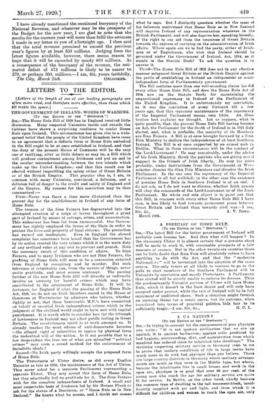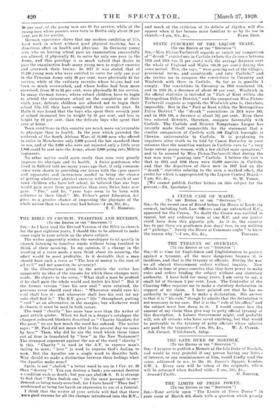A C3 NATION ?
[TO Tar EDITOR Or THE " SPECTATOR.") trying to account for the commonness of poor physique you write: "It is not modern civilization that we are up against, it is ancient barbarism; against evils produced by bad hygiene. overcrowding, dirt, and malnutrition from which mankind has suffered since he inhabited lake dwellings." The statistics respecting military service in Germany seem to me to prove that modern conditions of life in large towns have much more to do with bad physique than you believe. There are large country districts in Germany where sanitary arranges. ments are much as they were in the Middle Ages, but where, because the inhabitants live in small houses and work in the open air, physique is so good that over 88 per cent. of the young men who reach the age for military service are quite fit for service. In Berlin, on the other hand, chiefly because the common type of dwelling is the tall tenement-block, insuf- ficiently supplied with air and light, and from which it is difficult for- children and women to reach ths open aiz , only 38 per cent, of the young men are fit for service, while of the young men whose parents were born in Berlin only about 20 per cent, are fit for service.
German experience shows that one modern condition of Wes hard work in school without good physical training, has a disastrous effect on health and physique. In Germany young men who on leaving school pass an examination successfully are allowed, if physically fit, to serve for only one year in the Army, and this privilege is so Much valued- that desire to pass the examination leads many young men to neglect exercise and overwork their brains. In 1877 it was stated that of 17,246 young men who were entitled to serve for only one year in the Prussian Army only 20 per cent, were physically fit for service, while of the ordinary recruits whose brains. had Tot been so much overworked, and whose bodies had been more exercised, from 50 to 55 per cent, were physically fit for service. In many German towns, where robust children have to begin to attend the elementary school on the completion of their sixth year, delicate children are allowed not to begin their school life till they have completed their seventh year. In Halle it was found that the boys who spent their seventh year at school increased less in weight by 31 per cent, and less in height by 43 per cent, than the delicate boys who spent that year at home.
Town conditions in this country are much more unfavourable to physique than to health. In the year which preceded the outbreak of the South African War, of 11,000 men who offered to enlist in Manchester only 3,000 passed the low standard then in use, and of the 3,000 who were not rejected only a little over 1,000 could be sent into the Army, about 2,000 going into Militia regiments.
No other nation could more easily than ours very greatly improve its physique and its health. A Swiss gentleman who lived in Salford told me many years ago that, if only common- sense were shown in providing our towns with the cpen spaces and apparatus and instructors needed to bring the chance of getting wholesome physical exercise within the reach of our town children who have left school, lie believed that our boys would gain more from gymnastics than even Swiss boys now gain. " For," said he, "your boys seem b be born with athletics in their blood." Mr. Fisher's great Education Act gives us a greater chance of improving the physique of the whole nation than we have ever had before.—I am, Sir, &es T. C. HORKFALL.



































 Previous page
Previous page